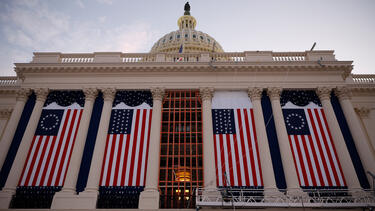Politics and Policy
What’s Next for Bangladesh after the Monsoon Revolution?
We talked to Yale SOM economist Mushfiq Mobarak, a member of a task force advising the interim government on economic strategy, about the reforms necessary to ensure a prosperous and democratic future for the country.

Are Trump’s Tariffs Repairing Market Failures or Eroding Global Trust?
Yale SOM’s Jeffrey Sonnenfeld and co-authors Stephen Henriques and Steven Tian write that while there are legitimate reasons for some tariffs, the president’s arbitrary approach is worrying allies and unsettling markets.

Does the Rasputin Curse Live Again?
Leadership expert Jeffrey Sonnenfeld and co-author Steven Tian look across history for examples of pitfalls that could lie ahead for Elon Musk and Donald Trump.

The Consequences of Slashing Medicaid Spending
Congressional Republicans are looking to make deep budget cuts, and Medicaid spending is a target. Yale SOM’s Dr. Howard Forman says that large-scale reductions in the program would hit the poorest states and the most vulnerable Americans especially hard.

How College Presidents Respond to Critiques of Higher Ed
According to Prof. Jeffrey Sonnenfeld and co-author Steven Tian, the college and university presidents who attended the Yale Higher Education Leadership Summit on January 28 are ready to fight back against attacks and make the case that American higher education is an “irreplaceable beacon of light and truth.”

A Partisan Mismatch with State Government Means Higher Borrowing Costs for Cities
Are red cities marooned in blue states—and blue cities in red states—at a financial disadvantage because of partisan politics? A new study co-authored by Yale SOM’s Anya Nakhmurina finds that cities whose leaders are from the opposite political party as their state governors are penalized in the bond market.
Donald Trump Has the Opportunity to End the Ukraine War
Yale SOM’s Jeffrey Sonnenfeld writes that with Russia’s economy teetering, the new president can push for an end to the war and even bring down the Putin regime.

Why CEOs Are Reaching Out to the New President
Yale SOM’s Jeffrey Sonnenfeld writes that business leaders are engaging with the new administration because they want to collaborate on areas of shared interest—and steer Trump away from ill-advised policies.

How Jimmy Carter Lost His Job and Found His Mission: A Personal Remembrance
Drawing on a decades-long relationship with Carter, Yale SOM leadership expert Jeffrey Sonnenfeld reflects on the vast achievements and sometimes bewildering contradictions in his post-presidency.

A Cheap Way to Change Lives
Yale SOM’s Dr. Howard Forman explains how the state of Connecticut is buying back the medical debt of thousands of low-income residents at cents on the dollar.

What Will the Return of Trump Mean for Connecticut’s Economy?
Professor Jeffrey Sonnenfeld and co-author Steven Tian write that the president-elect’s policies could have disruptive effects on some of the state’s most important industries, for better and for worse.
